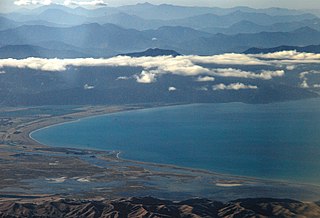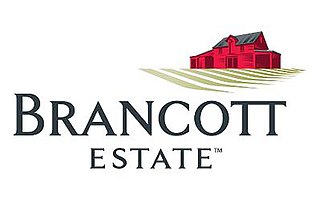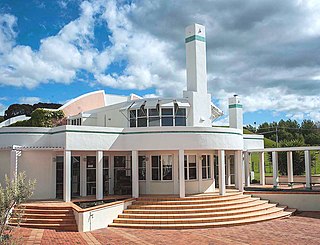
Merlot is a dark blue–colored wine grape variety that is used as both a blending grape and for varietal wines. The name Merlot is thought to be a diminutive of merle, the French name for the blackbird, probably a reference to the color of the grape. Its softness and "fleshiness," combined with its earlier ripening, make Merlot a popular grape for blending with the sterner, later-ripening Cabernet Sauvignon, which tends to be higher in tannin.

Hawke's Bay is a region on the east coast of New Zealand's North Island. The region is named for Hawke Bay, which was named in honour of Edward Hawke. The region's main centres are the cities of Napier and Hastings, while the more rural parts of the region are served by the towns of Waipukurau, Waipawa, and Wairoa.

Marlborough District or the Marlborough Region, commonly known simply as Marlborough, is one of the 16 regions of New Zealand, located on the northeast of the South Island. Marlborough is a unitary authority, both a district and a region. Marlborough District Council is based at Blenheim, the largest town. The unitary region has a population of 52,200.

Waiheke Island is the second-largest island in the Hauraki Gulf of New Zealand. Its ferry terminal in Matiatia Bay at the western end is 21.5 km (13.4 mi) from the central-city terminal in Auckland.

The Awatere River is a large river flowing through Marlborough, New Zealand. Flowing along the trace of the active Awatere Fault, it runs northeast through a straight valley to the west of the Inland Kaikōura mountains. This valley is parallel with that of the Waiau Toa / Clarence River, 20 kilometres (12 mi) to the south.

Corbans Wines was one of New Zealand's oldest wineries, established in 1902 by Assid Abraham Corban, a Lebanese immigrant who had arrived in New Zealand ten years earlier. Corbans Wines grew to become the second largest producer of wine in New Zealand, until they were purchased by their largest competitor Montana Wines in 2000. Following several takeovers of Montana by Allied Domecq and then Pernod Ricard, the Corbans brand was spun off in 2011 and is now owned by Lion.

New Zealand wine is produced in several of its distinct winegrowing regions. As an island country in the South Pacific Ocean, New Zealand has a largely maritime climate, although its elongated geography produces considerable regional variation from north to south. Like many other New World wines, New Zealand wine is usually produced and labelled as single varietal wines, or if blended, winemakers list the varietal components on the label. New Zealand is best known for its Marlborough Sauvignon Blanc, and more recently its dense, concentrated Pinot Noir from Marlborough, Martinborough and Central Otago.

Cloudy Bay Vineyards is a winery based in the Marlborough wine region of New Zealand, with vineyards in both Marlborough and Central Otago. Established in 1985 as one of the earliest wineries founded in Marlborough, Cloudy Bay attracted international acclaim for its first Sauvignon Blanc wines in the 1980s and was instrumental in establishing New Zealand's international reputation for white wine. It was acquired by Champagne house Veuve Clicquot in 2003 and is now a LVMH brand.
New Zealand Winegrowers is the national industry body that represents New Zealand's viticulture and winemaking sectors. It conducts research, promotion, marketing and advocacy in the interests of New Zealand grape growers and winemakers, both domestically and in international export markets. Winemakers and grape growers are automatically entitled to membership of New Zealand Winegrowers through payment of the levies on grape or wine sales required by law in the Commodity Levies Act 1991 and the Wine Act 2003. This combined with New Zealand's small size means that it is the only country in the world with a single national wine industry body.

Brancott Estate is the brand adopted since 2010 by Pernod Ricard for New Zealand's largest wine producer, formerly Montana Wines, which now operates as the New Zealand division of Pernod Ricard Winemakers. The name comes from its Brancott winery in Blenheim, and was chosen to reduce confusion in the United States market with wines from the state of Montana.

Villa Maria Estate is one of New Zealand's wine companies. Their vineyards are located throughout New Zealand, with production bases in Gisborne, Hawke's Bay, Marlborough and Auckland.

Alcohol has been consumed in New Zealand since the arrival of Europeans. The most popular alcoholic beverage is beer. The legal age to purchase alcohol is 18. New Zealand has an above average consumption rate of alcohol, in 2016 ranking 32nd globally in per-capita total alcohol consumption.

Marlborough Lines Limited is an electricity distribution company, based in Blenheim, New Zealand. Marlborough Lines is responsible for subtransmission and distribution of electricity to approximately 26,000 customers in the Marlborough Region over a service area of 11,330 km2 (4,370 sq mi). The network includes approximately 3,400 km (2,100 mi) of power lines extending to some very isolated areas across the region, including the extremities of the Marlborough Sounds, which can only be reached by boat or helicopter.

Invivo Wines is a New Zealand wine company, currently based in the historic Te Kauwhata winery south of Auckland. It produces wine in partnership with TV celebrities Graham Norton and Sarah Jessica Parker, and aims to appeal to casual wine drinkers by avoiding the sort of marketing its founders perceive is too pompous or flowery. Invivo wines have won several awards and trophies in various international wine competitions, and its unorthodox approach to fund-raising and marketing won it the 2009 New Zealand Innovation in Wine Marketing Trophy, as well as two trophies for their Invivo X, SJP global launch at the 2020 New Zealand Marketing Awards.

Stuart Tayler Smith is a New Zealand National Party politician. He was first elected as a Member of the New Zealand House of Representatives for the Kaikōura electorate, representing the National Party, in the 2014 general election.

Te Mata Estate is an independent, family-owned Hawke's Bay winery and New Zealand's oldest, in continuous operation since 1895. The winery produces everything on-premises at their Havelock Hills site near Havelock North, 15 kilometres (9.3 mi) south of Napier. Established in the late 19th century by the Chambers family, the winery and original vineyards were the first to be heritage-protected, and is one of New Zealand's most highly regarded wineries.

The Hawke's Bay wine region is New Zealand's oldest and second-largest wine-production region, on the east coast of the North Island. Production reached 41,000 tonnes in 2018 from 4,681 hectares of planted vines, representing 10.2% of total national production. Some of the oldest wineries still operating in New Zealand, including Te Mata Estate, Church Road, and Mission Estate, were established in the Hawke's Bay area in the late 19th century. Despite this, it was only established as a geographical indication (GI) in 2018. The GI protects any wine produced within the boundaries of the entire Hawke's Bay Region, but in practice the vineyards are chiefly concentrated in the plains and low hills surrounding the cities of Napier and Hastings.

The Marlborough wine region is by far New Zealand's largest, accounting for three quarters of the country's wine production, 70% of its vineyard area and 85% of its wine exports. A Geographical Indication in the north-east of the South Island, it covers the entire Marlborough District and the Kaikōura District of the Canterbury Region, but in practice the vineyards are concentrated around the Blenheim and Seddon townships. Internationally, Marlborough Sauvignon Blanc is recognised as world class; wine writers such as Oz Clarke and George Taber have described it as the best in the world.

Mission Estate Winery is New Zealand's oldest surviving winemaking concern, first established in the Hawke's Bay in 1851 by French Catholic Marist missionaries for producing sacramental wine. It is one of the largest wineries in the Hawke's Bay and remains wholly New Zealand owned.

Seifried Estate Winery is a family owned winery and vineyard based in Nelson, New Zealand. The winery was founded by Hermann Seifried and his wife Agnes in 1973 as a part time business, and is now the South Island's oldest commercial vineyard.



















